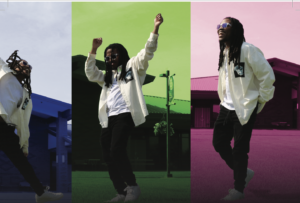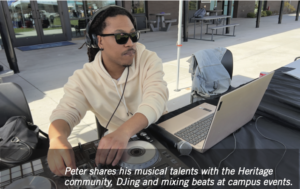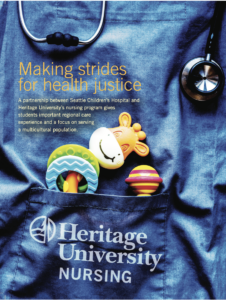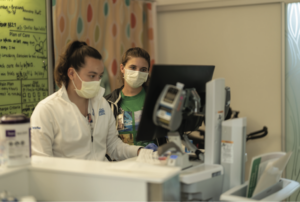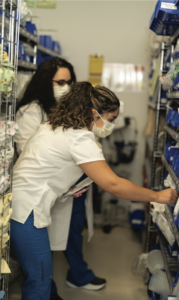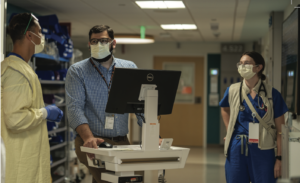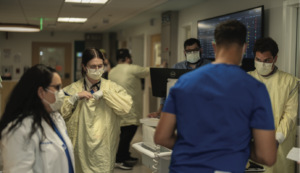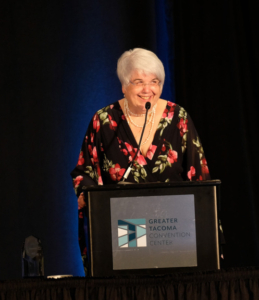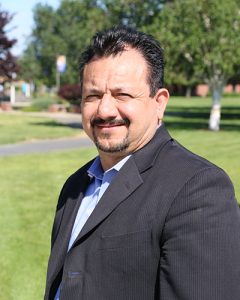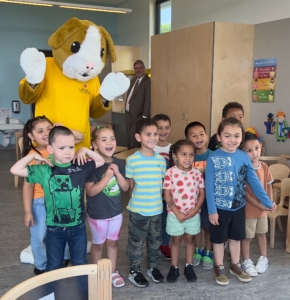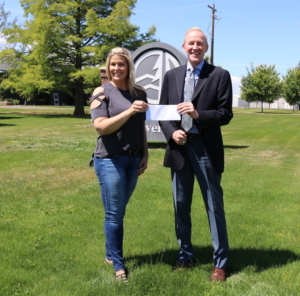Eagles soaring – WINGS Summer 2023
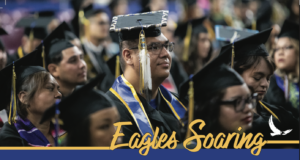
After years of sacrifice and late-night study sessions, Heritage graduates celebrated earning their degrees at the 2023 Commencement in May.
All totaled 239 students earned their undergraduate and graduate degrees at Heritage this academic year.
This year’s Commencement address was given by Phyllis Gutiérrez Kenney, who retired after serving as a representative of the 46th legislative district of Washington state from 1997 to 2012. She is a former small-business owner, delegate to the White House Conference on Small Business, President of the Hispanic Chamber of Commerce, and Assistant Commissioner for the Employment Security Department. The student addresses were given by Andrea Ceja (B.A., Business Administration) and Alfredia Thompson (M.I.T., Elementary Education).
Seventeen undergraduate students graduated with a perfect 4.0 GPA, earning them the Board of Directors Academic Excellence Award: Lizette Santos Guijarro, Maria Mendoza, Jiovanna Roman, Rosa Valenzuela, Biriana Carachure, Aisha Cervantes Acuna, Arisbeth Borges, Elvia Valdovinos Cruz, Julian Licea, Daisy Fernandez, Michael LeClair, Brenda Palencia, Carsen Bach, Beau Filbert, Diane Chavez, Maria Reyes, Elizabeth Juarez. Additionally, Heritage awards the President’s Student Award of Distinction to a single undergraduate with a distinguished record of academic excellence and service to the university.
This year’s recipient was Kathleen Sanchez (B.A.Ed., Elementary Education). Sanchez graduated magna cum laude. During her time at Heritage, she was involved in the Student Government Association, a member of Kappa Delta Chi sorority, a work-study for several departments, and a volunteer assisting with marketing and fundraising.
Additionally, Heritage recognized Ryan Washburn (B.A., Interdisciplinary Studies in Education) as the 2023 Violet Lumley Rau Alumnus of the Year.
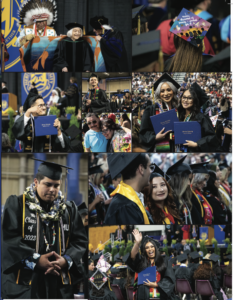

ASSOCIATE OF ARTS
Business Administration
Vanessa Lynn Estrada
Interdisciplinary Studies in Mathematics
Torre Alexis Chavez
Interdisciplinary Studies in Mathematics
Jose DeJesus Ramos
Social Science
Angel Ramirez
BACHELOR OF ARTS
Biology
Emilee Jane Bernath
Andrea Mendozav
Business Administration
Eric Agaton Ang
Gabriel B. Albert
Kathleen Leann Aragon
Perla Ximena Bolaños Zapien
Manuel Carbajal
Andrea Ceja
Anajeli Delaluz
Rafael Farias, Jr.
Karina Garzon
Tania Lopez
Sukay Navarrete
Juan Manuel Quintero Macias, Jr.
Pablo Gerardo Vera Rivera
Zeena Waheneka
Criminal Justice
Nayeli Arroyos
Jose Basilio
Yesenia Bengochea
Christopher Mitchel Clinton Berk
Briana Ruvi Carachure
Briseida Carbajal-Prudencio
Erandy Caro
Janet Lorraine Dixon
Alayna Juliane Fernandez
Erick Flores
Sheree Lynn Mahoney
Carson Bigbear Northwind
Gerardo Perez
Elizabeth Perez Hernandez
Adrian Ramirez
Anahi Razo
Marisol Rodriquez
Karina Sanchez
Ivan Santiago
Jerrilyn Stevens
Oscar Alanis Suarez
Diana Nohemi Valdivia Ortiz
Catalina Valencia Gomez
Jacquelyn Vargas
English
Anjuli Anagelie Barragan
Mary-Alice Elizabeth Correa
Environmental Studies
Noah Matthew Sampson
History
Anjuli Anagelie Barragan
Jacquelyn Vargas
Interdisciplinary Contract
Yadira Escoto
Mathematics
Josue Aguilar
Mathematics Education
(5-12 Credential)
Ben George Whitings
Psychology
Adriana Bravos
Melany Bridgett Cesena Salinas
Elizabeth Guerrero Fariass
Zahira Vanessa Flores-Gaona
Jacaranda Isabeth Garcia-Tovar
Elizabeth Gil-Ambriz
Stephanie Louise Gomez
Kamimsa Josephine Goudy
Violeta Yoselin Herreras
Maria Magdalena Mendoza
Lizbeth Morales
Cristal Quiroz Marin
Jiovanna Roman
Lizette Santos Guijarro
Rosa M. Valenzuela
Tori Katie Wapsheli
Veronica Louann Wilsey
Visual Arts
Felicia Sondrol
Allison Kaylee Platsman
Karen C. Reyess
Aaron Maldonado Valadez
BACHELOR OF ARTS IN EDUCATION
Elementary Education (K-8)
Tania Adalia Alvarez
Audrey Roberta Armstrong
Broam Arroyo
Carlos Issac Cantu
Darlene Carrillo-Rangel
Aisha Cervantes Acuna
Alondra Cruz-Valladaress
Yasmin Cuellar
Jennifer Guadalupe Flores Romero
America Naomi Fonseca
Julissa Garcia
Itzy Gissel Gonzalez
Anna Laura Guzman
Jessica Lizbeth Guzman
Sandra Yoana Guzman
Serena Hernandez
Maira Guadalupe Hernandez Gonzalez
Brandon Clay Humphrey
Christa Marie Jimenez
Sandra Ledezma
Diana Cristal Martinez
Israel Roel Mendez
Lorena Mercado
Crystal Mesina
Elise Chreie Moneymaker
Annahi Morfin Ixtas
Ana Laura Olivares
Vicente Fabio Olivares
Joel Lorenzo Ortgea Lozano
Sandra Rabadan
Shakira Ramiraz Moctezuma
Alisha Nicole Ramos
Ana Victoria Ruiz
Melissa Ruiz Moreno
Liliana Sanchez
Jose Sanchez Salas
Kathleen Sanchez
Katelyn Marie Schell
Christopher Silva
Marcos Daniel Silva
Maria Guadalupe Tellez
Andrew Uribe
Middle-Level Education
Karina Colin-Cordna
Jacqueline Tlatelpa Zacatenco
BACHELOR OF SCIENCE
Accounting
Eden S.C. Davis
Adrian Guerra
Carlos Daniel Iraheta
Tina Marie Janes
Samuel Segovias
Biology
Abigail Bravo
Nathan Shawn Buck
Jesus Alberto Buenrostro Mendoza
Guadalupe Merced Iniguez
Zuzeth Danila Jimenez
Elizabeth Juarez
Yaritza Silva Maravilla
Miguel Mendoza
Ruby Nava-Guevara
Tyler Jonah Olney
Mayra Lizeth Quintero Luciano
Brenda Yesenia Gonzalez
Elizabeth Nicole Van Corbach
Trystin Nikole Yanez
Biology Biomedical
Maria Isabel Barrios Hernandez
Environmental Science
Xavier Martinez Chavez
Darren Eugene Olney
BACHELOR OF SCIENCE IN NURSING
Nursing
Rosalinda Arreola
Cindi J. Badillos
Hema Balderas
Evelyn Arisbeth Borges
Cecilia Marie Delaney Druffner
Kristina Kay Dillon
Rachel Aubrey Elizabeth Duce
Guadalupe Gabriela Garcia
Love Ann Faith Garza
Abigahil Garzon
Luis Felipe Juarez
Yasmin Lopez
Brenda Jazmin Luna-Lopez
Samantha Paris Peterson
Gabriela Guadalupe Rodriguez Suarez
Rosario Jazmin Ruiz Gonzalez
Jaquelyn Marie Scott
Maria Jose Soto
BACHELOR OF SOCIAL WORK
Social Work
Angie J. Aguilar
Jennifer Alvarez
Maria Guadalupe Alvarez
Carsen Lee Bach
Amanda J. Beavert
Elizabeth Desiree Belieu
Maria Esthela Bernal
Elisabeth M. Blanchard
Judy Edit Bucio-Salas
Lizette Campos
Gabriela Castaneda
Sergio Cervantes
Nancy Diane Chavez
Courtney Kristine Corbitt
Guadalupe Delgado
Erica Gabriela Diaz
Karen Diaz
Chestina Sally Ann Dominquez
Sophie Larraine Elwell
Daisy Marie Fernandez
Beau Daniel Filbert
Dalia Gomez Giron
Isabel Gonzalez Perez
Lizeth Gonzalez Orozco
Jaqueline Hidalgo Lopez
Christina Rose Laws
Michael Laird LeClair
Julian Alejandro Licea
Enrique Jose Licona
Desiree Denise Gonzalez
Miriam Longoria
Maria Elena Lopez
Alma E. Lopez
Jessica Macias
Christian Mendoza Magallan
Lilia Martinez
Sharmira Marita Moore
Alejandra Morales
Orlando Munoz Delgadillo
Mami Nyafuraha
Brenda Faviola Palencia Viveros
Maria Reyes
Amanda R. Rodriguez
Monique Sarae Rodriguez
Jasmine Nicole Romero
Ashely Sabalza
Jenny Lee Sanchez
Stephanie Sanchez
Katellin Santiago
Aiyh A. Sarama
Janette M. Torres
Thanya Michelle Valdovinos
Elvia Mireya Valdovinos Cruz
Justina Marie Valenguela
Jayleen Nohemi Vasquez
Deanna Vasquez Chavez
Kaylee Ann Wade-Walsh

MASTER OF ARTS
Multicultural English Literature and Language
Myriah Starr Barringer
SaraBecca Martin
Elizabeth Christine Nelson
MASTER OF ARTS IN EDUCATION
Educational Administration (Principal)
Bethany Nicole Cardenas
Dusty Wirtzberger
Joseph Wirtzberger
MASTER IN TEACHING
Elementary Education
Sina Ari Bigelow
Brenda Cardona
Kathleen Megan Habel
Lindsay Nicole Nelson
Elementary Education Specialization in English Language Learners
Yosi Barajas
Clarisa Calderon
Oswald R. Fonseca
Luis Adrian Horn
Norma Imelda Manzanarez
Fabiola Ramirez-Leon
Erika Sanchez
Alla Mikhaylovna Shvets
Megan Grace Wilkinson
Cresanna L. Zintzun
Elementary Education with a Specialization in Special Education
Cassandra Justine Berry
Maggie Lynn Fiocchi
Kayla Christine Johnson
Ryan Kahl
K. Scott Reinmuth
Shawn Leonard Scabby Robe
Charlotte Marie Schroeder


